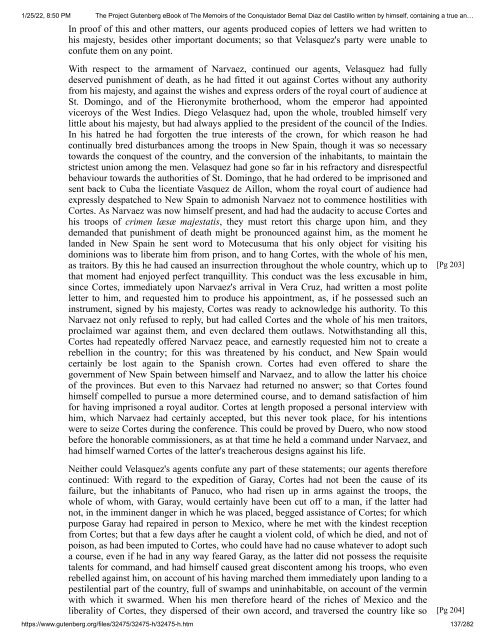You also want an ePaper? Increase the reach of your titles
YUMPU automatically turns print PDFs into web optimized ePapers that Google loves.
1/25/22, 8:50 PM <strong>The</strong> Project Gutenberg eBook <strong>of</strong> <strong>The</strong> <strong>Memoirs</strong> <strong>of</strong> <strong>the</strong> <strong>Conquistador</strong> <strong>Bernal</strong> <strong>Diaz</strong> <strong>del</strong> <strong>Castillo</strong> written by himself, containing a true an…<br />
In pro<strong>of</strong> <strong>of</strong> this and o<strong>the</strong>r matters, our agents produced copies <strong>of</strong>letters we had written to<br />
his majesty, besides o<strong>the</strong>r important documents; so that Velasquez's party were unable to<br />
confute <strong>the</strong>m on anypoint.<br />
With respect to <strong>the</strong> armament <strong>of</strong> Narvaez, continued our agents, Velasquez had fully<br />
deserved punishment <strong>of</strong> death, as he had fitted itout against Cortes without any authority<br />
from his majesty, and against<strong>the</strong> wishes and express orders <strong>of</strong> <strong>the</strong> royal court <strong>of</strong> audience at<br />
St. Domingo, and <strong>of</strong> <strong>the</strong> Hieronymite bro<strong>the</strong>rhood, whom <strong>the</strong> emperor had appointed<br />
viceroys <strong>of</strong> <strong>the</strong> West Indies. Diego Velasquez had, upon<strong>the</strong> whole, troubled himself very<br />
little about his majesty, but hadalways applied to <strong>the</strong> president <strong>of</strong> <strong>the</strong> council <strong>of</strong> <strong>the</strong> Indies.<br />
In his hatred he had forgotten <strong>the</strong> true interests <strong>of</strong> <strong>the</strong> crown, for which reason he had<br />
continually bred disturbances among <strong>the</strong> troops in NewSpain, though it was so necessary<br />
towards <strong>the</strong> conquest <strong>of</strong> <strong>the</strong> country,and <strong>the</strong> conversion <strong>of</strong> <strong>the</strong> inhabitants, to maintain <strong>the</strong><br />
strictest unionamong <strong>the</strong> men. Velasquez had gone so far in his refractory and disrespectful<br />
behaviour towards <strong>the</strong> authorities <strong>of</strong> St. Domingo, that hehad ordered to be imprisoned and<br />
sent back to Cuba <strong>the</strong> licentiateVasquez de Aillon, whom <strong>the</strong> royal court <strong>of</strong> audience had<br />
expresslydespatched to New Spain to admonish Narvaez not to commence hostilitieswith<br />
Cortes. As Narvaez was now himself present, and had had<strong>the</strong> audacity to accuse Cortes and<br />
his troops <strong>of</strong> crimen læsæ majestatis, <strong>the</strong>y must retort this charge upon him, and <strong>the</strong>y<br />
demanded that punishment<strong>of</strong> death might be pronounced against him, as <strong>the</strong> moment he<br />
landed in New Spain he sent word to Motecusuma that his only object for visiting his<br />
dominions was to liberate him from prison, and to hangCortes, with <strong>the</strong> whole <strong>of</strong> his men,<br />
as traitors. By this he had causedan insurrection throughout <strong>the</strong> whole country, which up to<br />
that momenthad enjoyed perfect tranquillity. This conduct was <strong>the</strong> less excusablein him,<br />
since Cortes, immediately upon Narvaez's arrival in Vera Cruz,had written a most polite<br />
letter to him, and requested him to produce his appointment, as, if he possessed such an<br />
instrument, signed by hismajesty, Cortes was ready to acknowledge his authority. To this<br />
Narvaez not only refused to reply, but had called Cortes and <strong>the</strong> whole<strong>of</strong> his men traitors,<br />
proclaimed war against <strong>the</strong>m, and even declared <strong>the</strong>m outlaws. Notwithstanding all this,<br />
Cortes had repeatedly <strong>of</strong>feredNarvaez peace, and earnestly requested him not to create a<br />
rebellion in <strong>the</strong> country; for this was threatened by his conduct, and New Spain would<br />
certainly be lost again to <strong>the</strong> Spanish crown. Cortes had even <strong>of</strong>fered to share <strong>the</strong><br />
government <strong>of</strong> New Spain between himself andNarvaez, and to allow <strong>the</strong> latter his choice<br />
<strong>of</strong> <strong>the</strong> provinces. But even to this Narvaez had returned no answer; so that Cortes found<br />
himselfcompelled to pursue a more determined course, and to demand satisfaction<strong>of</strong> him<br />
for having imprisoned a royal auditor. Cortes at lengthproposed a personal interview with<br />
him, which Narvaez had certainly accepted, but this never took place, for his intentions<br />
were to seizeCortes during <strong>the</strong> conference. This could be proved by Duero, whonow stood<br />
before <strong>the</strong> honorable commissioners, as at that time he helda command under Narvaez, and<br />
had himself warned Cortes <strong>of</strong> <strong>the</strong>latter's treacherous designs against his life.<br />
[Pg 203]<br />
Nei<strong>the</strong>r could Velasquez's agents confute any part <strong>of</strong> <strong>the</strong>se statements;our agents <strong>the</strong>refore<br />
continued: With regard to <strong>the</strong> expedition <strong>of</strong> Garay, Cortes had not been <strong>the</strong> cause <strong>of</strong> its<br />
failure, but <strong>the</strong> inhabitants <strong>of</strong> Panuco, who had risen up in arms against <strong>the</strong> troops, <strong>the</strong><br />
whole <strong>of</strong> whom, with Garay, would certainly have been cut <strong>of</strong>f to a man,if <strong>the</strong> latter had<br />
not, in <strong>the</strong> imminent danger in which he was placed,begged assistance <strong>of</strong> Cortes; for which<br />
purpose Garay had repaired inperson to Mexico, where he met with <strong>the</strong> kindest reception<br />
from Cortes;but that a few days after he caught a violent cold, <strong>of</strong> which he died, andnot <strong>of</strong><br />
poison, as had been imputed to Cortes, who could have had nocause whatever to adopt such<br />
a course, even if he had in any way fearedGaray, as <strong>the</strong> latter did not possess <strong>the</strong> requisite<br />
talents for command,and had himself caused great discontent among his troops, who even<br />
rebelled against him, on account <strong>of</strong> his having marched <strong>the</strong>m immediatelyupon landing to a<br />
pestilential part <strong>of</strong> <strong>the</strong> country, full <strong>of</strong> swampsand uninhabitable, on account <strong>of</strong> <strong>the</strong> vermin<br />
with which it swarmed. When his men <strong>the</strong>refore heard <strong>of</strong> <strong>the</strong> riches <strong>of</strong> Mexico and <strong>the</strong><br />
liberality<strong>of</strong> Cortes, <strong>the</strong>y dispersed <strong>of</strong> <strong>the</strong>ir own accord, and traversed <strong>the</strong> countrylike so<br />
[Pg 204]<br />
https://www.gutenberg.org/files/32475/32475-h/32475-h.htm 137/282


















